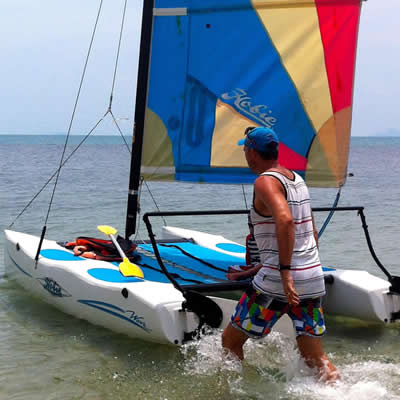The King
His Majesty King Bhumibol Adulyadej is almost universally revered by Thai nationals and held in the highest level of regard and admiration as evidenced by his picture prominently displayed throughout the Kingdom. Remember that Thailand has and does enforce the national lèse majesté laws. These laws expressly prohibit any act - verbal, physical or written, that shows insolent or disrespectful behaviour toward any member of the Royal family.
Therefore, out of respect for His Majesty and laws of the Kingdom, never say or do anything disrespectful of the King or any member of the royal family, even to the extent of stomping on a Thai coin or banknote which has been dropped and is rolling/blowing away. All banknotes and coins in Thailand bear a portrait of His Majesty, and to be stomped on by your foot would be considered extremely disrespectful.
The "Wai"
It is pronounced like the English word "why" and is a traditional Thai form of expressing welcome, thanks, recognition, an apology or goodbye. This is performed by placing your palms together and bringing them up towards your chin whilst bowing your head slightly. If you do not feel comfortable to perform a 'wai', the appropriate hand positions to use, and the correct social circumstances in which to use it, it is perfectly acceptable to acknowledge a "wai" with a wide smile and a slight nod of the head.
The use of the "wai" in Thai culture, and between Thais, carries many social messages and nuances. As most foreigners are not familiar with these cultural aspects, it is generally overlooked when we don't get it quite right. The fact that we make the effort is much appreciated by most Thais.
A Few Useful Phrases
At the very least, it is generally appreciated if you can attempt a few phrases in Thai; even if it's just the basic 'Hello' and 'Thank You'. The phrase you will most likely hear many, many times during your stay is the one that accompanies the 'Wai' gesture, as described above.
The phrase has multiple meanings and is generally used as a form of welcome, hello or goodbye and is said at the same time as performing the 'Wai'. The pronunciation is subtly different depending on whether you are female or male:
- Women say - Sawatdee Kaa (pronounced Sa-wat-dee Kar)
- Men say - Sawatdee Khrab (pronounced Sa-wat-dee Krab)
You will see Sawatdee spelt phonetically in any number of different ways (Sawatdee/Sawasdee/Sawadee) but they all equate to slightly different interpretations of the same phrase. None of them seems to have the monopoly.
It is polite to add the Kaa/Khrab ending to most Thai phrases, depending on whether you are female or male. Here are some other phrases:
- Thank you - Khop Khun Kaa / Khop Khun Khrab
- I don't want - Mai ow Kaa / Mai ow Khrab (deters persistent vendors)
- Sorry - Khor thot Kaa / Khor thot Khrab
Temples and Monks
When visiting temples, please remember that these are active places of worship and accordingly, make sure that you dress conservatively. For women, clothing should include long skirts or trousers, with no bare shoulders or knees. Some temples have a no-photography policy or limit the use of flash photography. Before taking any pictures please inquire about limitations and restrictions.
When entering any place of worship, always remove your shoes. In many Asian cultures the feet are considered the lowest and dirtiest part of the body, whereas the head is regarded as the highest.
Therefore, do not sit with your feet pointing towards an image of Buddha. If possible, you should sit either cross-legged or with your feet tucked behind you. Do not use your feet to point, move objects or point to a persons head. Your feet must never touch another persons head or touch a Monk.
Special Note for Women
Women must never in any way, shape or form touch a Monk. If a female needs to pass an item to a Monk, it must be either passed to another male (not a monk) first, or placed down for the Monk to retrieve himself. There must never be direct contact between a Monk and a female.
Topless/Nude Sunbathing
Thai people are very modest in nature, and any form of public nudity is frowned upon. There are no nude beaches in Thailand. Modesty reigns supreme here.
Breast Feeding Etiquette
Discretion and modesty is best.
Your Temper
Thais value and respect people who keep and maintain a level and calm demeanour. Any loud or abusive outbursts of anger should be avoided at all costs. While things may not always go according to plan, tourists are well advised to maintain a level and calm demeanour, despite any annoyances. Try to maintain a smile and in the end you will probably get what you want. Irrespective of how you behave at home, in Thailand, keep your temper and emotions under control.
Public Displays of Affection
Overt displays of kissing, cuddling etc., in plain public view is frowned upon.
Your Feet
Using your feet to "point" to anything is considered rude. Touching someone or something with your feet is offensive.
The Head
Touching someone on the head, even in fun "can" be offensive and is considered rude (except among good friends). You would never dare touch someone's head with your foot.
Taking Photos
Just as you wouldn't like a stranger walking up to you and snapping your photo, be respectful and ask first before doing the same in Thailand especially with Monks. Note that some rural hill-tribe people believe that a photograph will 'capture' their soul and will object to being photographed.
Taxis
When attempting to hail a taxi, it is customary and polite to keep your arm extended outwards, your hand facing horizontal with palm-side down. Signalling a taxi by holding your hand with fingers "up" is considered rude. Similarly, whistling, clicking fingers or making other type noises to attract a person's attention is considered rude. Such methods are considered only appropriate for animals, such as a dog.
Tipping
This is not mandatory as service charges are nearly always added to your bill in restaurants and bars and these should find their way to the staff. However, it is customary to round up or leave small change, and if you have enjoyed an exceptional meal and service an extra tip is always appreciated, say 5-10%.















